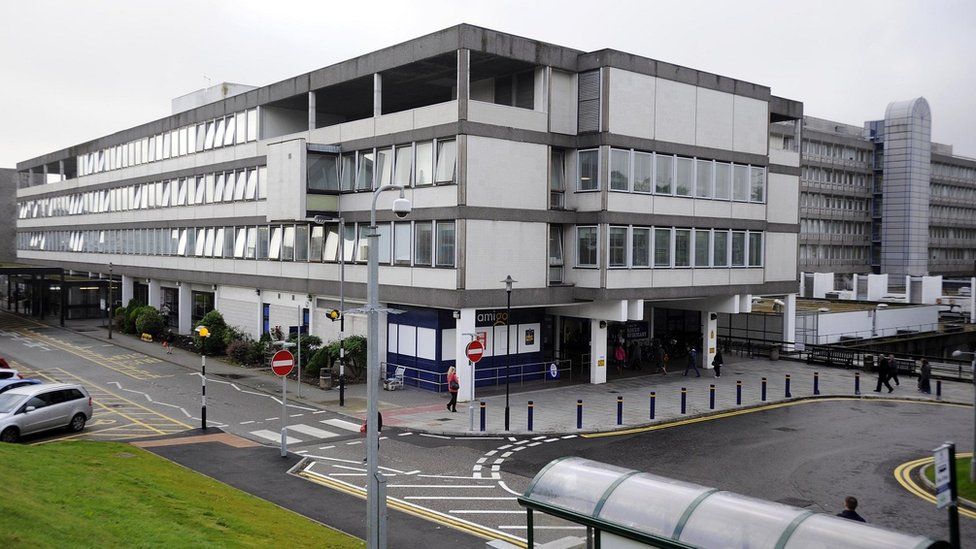
Aberdeen Royal Infirmary’s emergency department has faced sustained problems with finding inpatient beds for people who no longer need to be in A&E
By Lisa Summers & Andrew Picken
BBC Scotland
A group of senior doctors has accused NHS Grampian of ignoring their safety concerns about emergency departments.
They told BBC Scotland News they were speaking out because they feel they cannot deliver a safe level of care.
The medics said staff shortages meant Grampian’s two A&Es have no senior registrars on shift to make key decisions about patients for the majority of weekend night shifts.
NHS Grampian said it was working hard to expand the workforce.
A spokesperson thanked staff and said it recognised the “tremendous pressure” on A&E departments but said here were was a national shortage of doctors at the appropriate level of training.
A number of senior doctors spoke anonymously to BBC News about conditions in Elgin and Aberdeen emergency departments.
Documents seen by the BBC News show medics have been raising concerns since 2021, both with NHS Grampian and the Scottish government, and in July this year submitted a formal whistleblowing complaint about the situation.
One doctor said: “The staff are in an impossible situation.
“We are witnessing ongoing harm with unacceptable delays to the assessment and treatment of patients.
“There have been avoidable deaths and at other times there are too long delays getting to patients who may be suffering from a serious condition like stroke or sepsis.”
In March last year, one senior clinician wrote to NHS Grampian bosses to warn of the “incredibly stressful and difficult” conditions in Aberdeen Royal Infirmary’s emergency department.
The letter warns of the dangers of ambulances “stacking” outside the hospital and a high number of patients with chest pains or headaches waiting for long periods of time to be seen.
‘Significant reason’
The document also has the medic declaring they have “no wish to go through what happened in 2014 again” – a reference to a staffing crisis that year in NHS Grampian.
The doctor points out they had just worked six weekends in a row to try and fill in schedule gaps before pointing out the current situation carries “significant clinical risk” and that “something significant has to change soon”.
Then in January this year, a joint letter signed by a number of staff in NHS Grampian emergency departments warned these A&Es were failing and “unlikely to be able to perform their statutory duty in a major incident”.
Image source, Jim MacBeath
Dr Gray’s Hospital in Elgin is one of two adult A&E departments in the NHS Grampian area
The letter said “exit block” – finding hospital beds for patients who no longer need to be in A&E – was the biggest patient safety concern.
It also included an estimate that between 30 December last year and 3 January this year, a total of 260 A&E patients were delayed in excess of eight hours in Grampian’s emergency departments.
Using Royal College of Emergency Medicine estimates on the impact of delays on patients’ life chances, they estimate these long waits equate to at least three excess deaths in that five-day period.
Five weeks after the joint letter was submitted a major incident was declared at Aberdeen Royal Infirmary on 22 February as a result of the pressures being felt by the service.
Recruitment struggles
NHS figures for the month of June show that 49% of patients who attended A&E at Aberdeen Royal Infirmary were seen, admitted or discharged within the target of four hours.
At Dr Gray’s hospital in Elgin, 77% were seen within four hours at its emergency department.
A spokesman for NHS Grampian said: : “We recognise that the emergency departments in NHS Grampian are under tremendous pressure – as is the case across Scotland.
“Thanks to the dedication and flexibility of our staff, we are confident in the services they provide to the public in Grampian.”
He said the health board had worked hard to expand the emergency department workforce, but acknowledged that consultant numbers were not yet at full capacity.
“The key recent pressure area has been the recruitment of doctors in training who are entering higher specialist training,” the spokesman added.
“These are nationally recruited and the levels across Scotland have been particularly low this year leading to a significant shortfall. This group of doctors are particularly important in the provision of night cover which is supported by a resident on-call consultant.”
What do you do when you feel that you have nowhere else to go?
In this case, a group of doctors say all of their efforts to raise concerns with senior management fell on deaf ears.
Having exhausted all other options, they have now turned whistleblowers in the hope that it will force the health board to address the serious patient safety issues they say they are facing.
NHS Scotland’s whistleblowing procedures were strengthened following an independent review into claims of a bullying culture at NHS Highland. But a recent survey by the BMA suggested nearly a quarter of doctors would still not feel comfortable raising a concern about patient safety or malpractice.
The official definition of whistleblowing relates to someone speaking up “in the public interest” about issues that could create “a risk of harm or wrong doing”.
The medics in Grampian say staffing levels are so dangerous in A&E that they pose a clear and significant risk to the people the NHS should be caring for.
The whole system is under so much pressure, and the whole country faces such difficulties finding enough skilled staff, that doctors can only hope this is a positive route to improvement.








